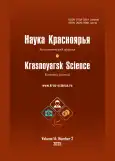Организационно-экономический механизм развития бизнес-процессов предприятий сферы бытовых услуг (на примере автосервиса): экосистемный подход
- Авторы: Груздо А.Д.1
-
Учреждения:
- Омский государственный университет путей сообщения
- Выпуск: Том 14, № 2 (2025)
- Страницы: 7-25
- Раздел: Статьи
- Статья опубликована: 30.06.2025
- URL: https://journal-vniispk.ru/2070-7568/article/view/304195
- DOI: https://doi.org/10.12731/2070-7568-2025-14-2-283
- EDN: https://elibrary.ru/PCGNVB
- ID: 304195
Цитировать
Полный текст
Аннотация
В условиях высококонкурентного рынка сферы бытовых услуг эффективное развитие бизнес-процессов является основой для повышения качества обслуживания, снижения издержек и формирования устойчивого спроса. Экосистемный подход к управлению процессами позволяет не только оптимизировать текущие ресурсы, но и создавать условия для партнерства и интеграции с другими участниками рынка. В статье рассматривается организационно-экономический механизм развития бизнес-процессов в сфере бытовых услуг на примере автосервисов. Организационно-экономический механизм направлен, как на регулирование взаимоотношений в экосистеме на основе формирования сети ценностей и институтов, так и на развитие бизнес-процессов предприятий сферы бытовых услуг (автосервисов), что способствует повышению качества обслуживания и уровню удовлетворенности клиентов. В качестве основы развития бизнес-процессов предприятий сферы услуг рассматривать баланс ценностей заинтересованных сторон (стейкхолдеров). В соответствии с представленной концепцией экосистемной модели развития бизнес-процессов предприятий автосервиса рассмотрена структура организационно-экономического механизма, включающего институциональные, аксиологические, экономические, организационные и коммуникационные (сетевые) инструменты.
Цель – исследование и совершенствование организационно-экономического механизма развития бизнес-процессов автосервисных предприятий, направленного на улучшение качества обслуживания и повышению эффективности взаимодействия между заинтересованными сторонами.
Метод и методология проведения работы. В основе работы лежат труды неоинституциональной, аксиологической теорий и концепция «Бережливого производства». Результаты работы получены на основе применения метода сравнительного междисциплинарного анализа исследований, касающихся структуры и механизмов развития процессов и экосистем. В целом исследование построено на комплексном подходе включающим системный, процессный и экосистемный компонент.
Результаты. Выявлено, что экосистемную модель можно рассматривать как основу организационно-экономического механизма развития бизнес-процессов предприятий сферы бытового обслуживания, в котором основными элементами выступают институциональные, аксиологические, экономические, коммуникативные инструменты. Предложенный механизм способствует повышению качество услуг и эффективности деятельности предприятий.
Область применения результатов. Полученные результаты целесообразно применять в автосервисной сфере для оптимизации процессов, повышения качества обслуживания и улучшения конкурентоспособности.
Об авторах
Артем Дмитриевич Груздо
Омский государственный университет путей сообщения
Автор, ответственный за переписку.
Email: sivanoff88@gmail.com
аспирант кафедры «Менеджмент, маркетинг и коммерция»
Россия, пр-т К. Маркса, 35, г. Омск, Российская Федерация
Список литературы
- Итоги деятельности за 2024 год. (2024). Официальный сайт компании Fit Service. Получено с https://omsk.fitauto.ru
- Куимов, В. В., Суслова, Ю. Ю., Щербенко, Е. В., & др. (2019). Кооперационно-сетевые взаимодействия как ресурс самоорганизации и достижения качественных результатов. Москва: ИНФРА-М. 225 с. ISBN: 978-5-16-015042-0 EDN: https://elibrary.ru/MYDCZS
- Легчилина, Е. Ю., & Груздо, А. Д. (2023). Теоретические подходы к управлению развитием экосистем малого бизнеса. Инновационная деятельность, (1(64)), 103–114.
- Парк ТС в РФ на 01.01.2025 г. (2025). Аналитическое агентство "Автостат". Получено с https://www.autostat.ru
- Платные услуги населению. Бытовые услуги населению. Получено с https://rosstat.gov.ru/uslugi
- Попов, Е. В., Симонова, В. Л., & Челак, И. П. (2022). Дифференциация уровней взаимодействия со стейкхолдерами инновационной экосистемы. Менеджмент в России и за рубежом, (1), 11–20. EDN: https://elibrary.ru/OQUOJO
- Шишкин, Д. Г. (2013). Сущность организационно-экономического механизма развития предпринимательских структур. Российское предпринимательство, 14(2), 27–33. EDN: https://elibrary.ru/PVRJBL
- Agarwal, R., & Selen, W. (2009). Dynamic capability building in service value networks for achieving service innovation. Decision Sciences, 40(3), 431–475. https://doi.org/10.1111/j.1540-5915.2009.00236.x
- Burke, W. W. (2023). Organization Development: A Process of Learning and Changing (2nd ed.). Reading, MA: Addison-Wesley Publishing Company.
- Chen, J.-S., Hung Tai Tsou, & Huang, A. Y.-H. (2009). Service delivery innovation: antecedents and impact on firm performance. Journal of Service Research, 12(1), 36–55. https://doi.org/10.1177/1094670509338619
- Eisingerich, A. B., Rubera, G., & Seifert, M. (2009). Managing service innovation and interorganizational relationships for firm performance: to commit or diversity? Journal of Service Research, 11(4), 344–356. https://doi.org/10.1177/1094670508329223
- Kohtamäki, M., Rabetino, R., Einola, S., Parida, V., & Patel, P. (2023). Servitization and digital servitization as socio-technical transitions. Journal of Business Research, 159, 113668.
- Kotter, J. P. (2022). Leading Change: Why Transformation Efforts Fail. Harvard Business Review, 73(2).
- Lee, R. P., Ginn, G. O., & Naylor, G. (2009). The impact of network and environmental factors on service innovativeness. Journal of Service Marketing, 23(6), 397–406. https://doi.org/10.1108/08876040910988183
- Valdez-de-Leon, O. (2019). How to develop a digital ecosystem: A practical framework. Technology Innovation Management Review, 9(8), 43–54. https://doi.org/10.22215/timreview/1260
Дополнительные файлы










